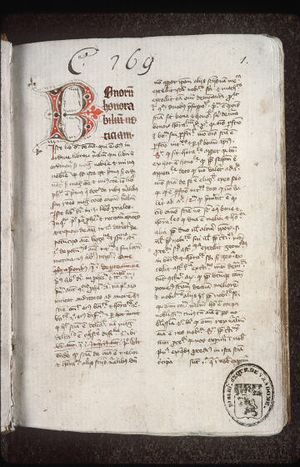جان بوريدان

جان بوريدان Jean Buridan (باللاتينية: Johannes Buridanus) (ح. 1300 – بعد 1358) كان كاهناً فرنسياً نثر بذور الثورة الكوپرنيقية في اوروبا.[1][2] وقد طور مفهوم قوة الدفع، الذي كان الخطوة الأولى نحو مفهوم القصور الذاتي المعاصر، والذي كان تطوراً هاماً في تاريخ علوم العصور الوسطى. وقد اشتهر اسمه بسبب تجربة فكرية تُعرف بإسم حمار بوريدان (تجربة فكرية لا تظهر في كتاباته التي وصلتنا).
لجان بوريدان مؤلف رائع في الطبيعة النظرية ومما يؤسف له أنه اشتهر بفضل حماره فحسب ولعله لم يكن صاحبه.
وقد ولد بورديان قرب آراس قبل عام 1300 وتلقى علومه ثم درس في جامعة باريس. وهو لم يعلل دوران الأرض اليومي حول الشمس فحسب بل إنه أسقط من علم الفلك المعارف الملائكية التي نسب إليها أرسطو وأوكونياس مسار الأجرام السماوية وحركاتها وقال بورديان: "لا حاجة بنا بعد اليوم إلى تفسير حركاتها أكثر من أنها بدأت تتحرك أصلاً بإذن الله وبقانون قوة الدفع- أن أي جسم يتحرك يستمر في الحركة ما لم تمنعه قوة موجودة". وهنا كان لبورديان فضل السبق على جاليليو وديكارت ونيوتن. واستطرد قائلاً إن حركة النجوم تحكمها نفس القوانين الآلية التي تتحكم في الأرض. وهذه الآراء التي تعد الآن رثة بالية كان لها أثر عظيم في هدم آراء الناس في العصور الوسطى. وهي تكاد تؤرخ لبداية الطبيعة الفلكية. ونقل تلاميذ بوريدان آراءه إلى ألمانيا وإيطاليا وتأثر بها ليوراند وكوبرنيكوس وبرنو وجاليليو ثم حملها ألبرت أمير ساكسونيا إلى الجامعة التي أنشأها في فيينا عام 1364 ونقلها مارسيليوس فون انجهن إلى الجامعة التي أسسها في هايدلبرج عام 1386.
. . . . . . . . . . . . . . . . . . . . . . . . . . . . . . . . . . . . . . . . . . . . . . . . . . . . . . . . . . . . . . . . . . . . . . . . . . . . . . . . . . . . . . . . . . . . . . . . . . . . . . . . . . . . . . . . . . . . . . . . . . . . . . . . . . . . . . . . . . . . . . . . . . . . . . . . . . . . . . . . . . . . . . . .
ببليوگرافيا
أعمال بوريدان
ديورانت, ول; ديورانت, أرييل. قصة الحضارة. ترجمة بقيادة زكي نجيب محمود.
- Hughes, G.E. (1982) John Buridan on Self-Reference: Chapter Eight of Buridan's Sophismata. An edition and translation with an introduction, and philosophical commentary. Cambridge/London/New York: Cambridge University Press, ISBN 0-521-28864-9.
- King, Peter (1985) John Buridan's Logic: The Treatise on Supposition; The Treatise on Consequences. Translation from the Latin with a Philosophical Introduction, Dordrecht: Reidel.
- Zupko, John Alexander, ed.&tr. (1989) 'John Buridan's Philosophy of Mind: An Edition and Translation of Book III of His ' Questions on Aristotle's De Anima (Third Redaction), with Commentary and Critical and Interpretative Essays.' Doctoral dissertation, Cornell University.
- Klima, Gyula, tr. (2001) John Buridan: 'Summulae de Dialectica'. Yale Library of Medieval Philosophy. New Haven, Conn./London: Yale University Press.
أعمال عن بوريدان
- Michael, Bernd (1985) Johannes Buridan: Studien zu seinem Leben, seinen Werken und zu Rezeption seiner Theorien im Europa des späten Mittelalters.[3] 2 Vols. Doctoral dissertation, University of Berlin.
- Klima, Gyula (2008) John Buridan New York: Oxford University Press.
- Landi, Marcello, Un contributo allo studio della scienza nel Medio Evo. Il trattato Il cielo e il mondo di Giovanni Buridano e un confronto con alcune posizioni di Tommaso d'Aquino, in Divus Thomas[4] 110/2 (2007) 151-185
- Thijssen, J. M. M. H., and Jack Zupko (ed.) (2001) The Metaphysics and Natural Philosophy of John Buridan. Leiden: Brill.
- Zupko, Jack (2003) John Buridan. Portrait of a Fourteenth-Century Arts Master. Notre Dame, Indiana: University of Notre Dame Press. (cf. pp. 258, 400n71)
انظر أيضاً
وصلات خارجية
- John Buridan entry in the Stanford Encyclopedia of Philosophy by Jack Zupko
- Bibliography by Fabienne Pironet (up to 2001)
- Buridan's Logical Works. I. An Overview of the Summulae de dialectica a detailed summary of the nine treatises of the Summulae de dialectica
- Buridan's Logical Works. II. The Treatise on Consequences and other writings a summary of the other logical writings
- Buridan: Editions, Translations and Studies on the Manuscript Tradition Complete bibliography of the logical and metaphysical works
- Buridan's Logic and Metaphysics: an annotated bibliography (updates the bibliography of Fabienne Pironet to 2011)
الهامش
